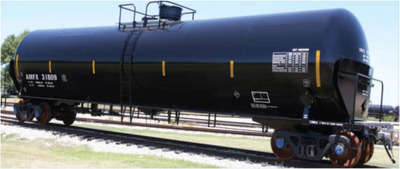Canada Should Bring in Stronger Rail Cars for Crude Before 2025 - official
Canada ought to require stronger tank cars for transporting flammable liquids sooner than the current deadline in 2025, Transportation Safety Board Chair Kathy Fox said on Thursday, noting that crude-by-rail shipments are expected to rise in the country.
"We understand that it can't happen all at once. But we'd like to see it sooner," Fox said in an interview, without giving a specific alternative date. "We do have an ongoing concern that flammable liquids be transported in the most robust tank cars."
Canada and the United States have introduced new requirements to more safely transport flammable liquids, after a 2013 runaway train explosion carrying crude killed 47 in the Canadian province of Quebec.
Older DOT-111 cars, used during the tragedy in Lac Megantic, Quebec, have already been replaced in Canada by CPC-1232 cars for moving crude oil, but even these must be completely phased out by May 1, 2025 for the transport of flammable liquids, according to the TSB.
They will need to be replaced by TC-117 cars, or retrofits that meet the same standard, which has thicker steel.
The U.S. Department of Transportation expects flammable liquids to be carried in comparable DOT-117 rail tank cars, or retrofits, by May 1, 2029.
Canada has not experienced a major derailment of a crude train since 2015, Fox said. But in the United States, a BNSF Railway Co freight train carrying crude oil derailed in northwest Iowa in June, sending some 230,000 gallons of oil into a state waterway.
Crude-by-rail transports, which have declined in Canada in recent years on declining oil prices, are showing signs of a resurgence.
Canada exported a record 204,558 barrels per day of crude by rail in June, the National Energy Board said on Wednesday, as oil shippers coped with congested pipelines.
That volume jumped 86 percent from a year earlier, but expanding oil producers have said they need to move much more to reduce a steep discount on their heavy crude prices.
Recommendations following Lac Megantic have led to improved oversight and standards for tank cars, Fox said. But she remains concerned over a recent rise in uncontrolled train movements that could be prevented with better training, less reliance on air or hand brakes and improved physical defenses.
"We're encouraged to see the progress made since Lac Megantic," she said. "But there is still more work to be done."
By Allison Lampert, Additional reporting by Rod Nickel in Winnipeg



